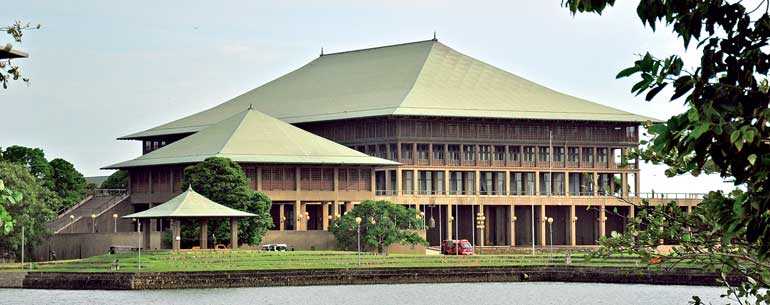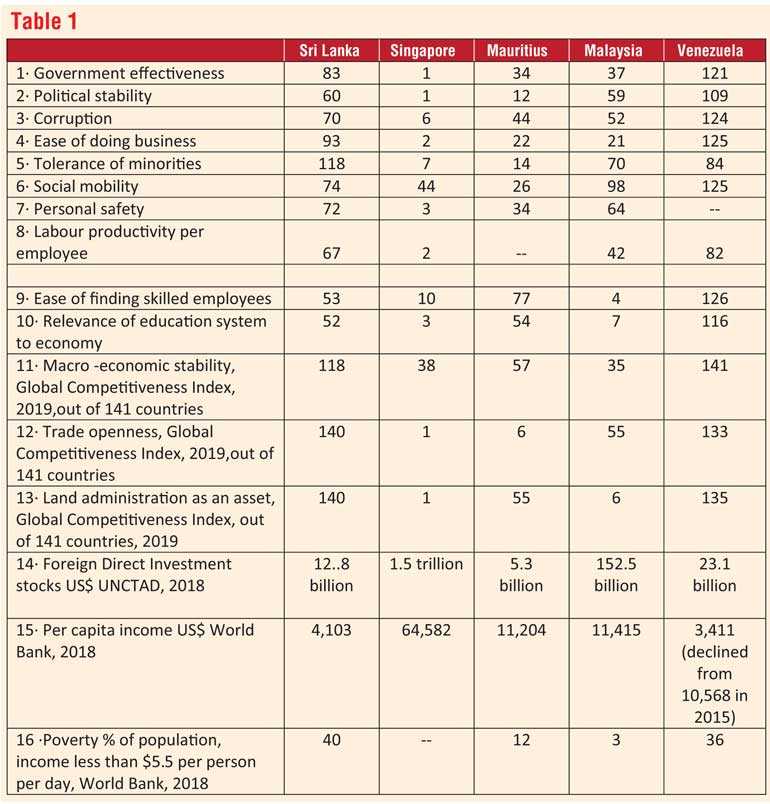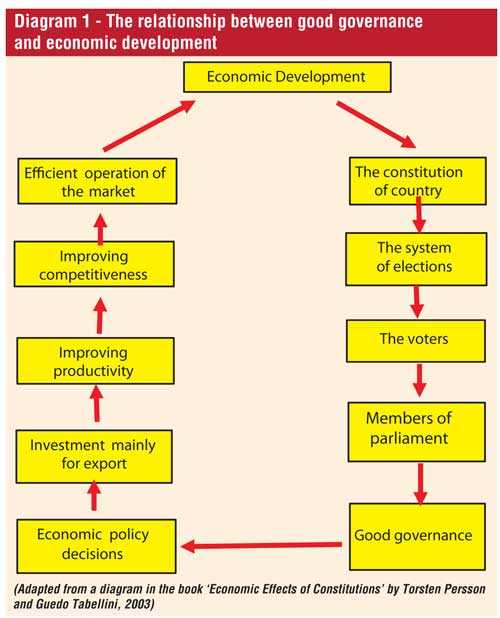Monday Feb 23, 2026
Monday Feb 23, 2026
Tuesday, 18 August 2020 00:05 - - {{hitsCtrl.values.hits}}

Sri Lanka has not been able to reach prosperity mainly because political parties and their leaders have failed to form a strong Constitution to guarantee an enabling environment for economic development consisting of socio political stability and good governance
This article will attempt to show the close connection between a process of successful economic development leading to prosperity and socio political stability on the one hand and good governance on the other both of which arise from a strong constitution.
But it will first highlight the achievements and failures of the economy of Sri Lanka (SL) in comparison with the performance of the economies of several other countries in an attempt to use the findings to prove the above mentioned point. See table 1.
Past performance of the economy 
Ranking of some economies including that of SL according to the Global Talent Competitiveness Index 2019, out of 125 counties; (other indices also used) is seen in table 1. The reader can decide whether Sri Lanka’s standing is approaching that of Singapore a highly prosperous country or that of Venezuela, a failed socialist dictatorship. Obviously it is not the former.
According to table 1 (item 16) poverty is around 40% of the population (this has to be checked in the field as a first step before venturing on an economic development process). GDP per capita wise also SL’s $ 4,103 is quite low compared to that of the other countries (item 15). Poverty is so high due mainly to the fact that the country had attracted a very low level of Foreign Direct Investment (FDI) amounting to a stock of $ 13 billion by 2018 compared for instance to the enormous stock of $ 1.5 trillion attracted by Singapore by 2018 (item 14 in the table).
This miserable situation could be attributed mainly to the failure of political parties and politicians who have ruled the country since 1956 to establish socio political stability (item 2 in the table) as well as good governance (item 1). As SL has very little savings to invest (average domestic savings during last five years being about 23% of Gross Domestic Product ($84 billion in 2019) when the country actually needs 35-40% of GDP to reach about 8% economic growth per annum), the country does not have adequate access to modern technologies as well as knowledge of markets in the rest of the world for exports, FDI is essential for economic development.
A very much higher level of FDI would certainly have enabled the country to avoid the poor rankings in the above table i.e. by creating sufficient jobs and producing goods and services mainly for export to earn adequate foreign exchange especially to import what the country cannot produce internally without incurring a high level of foreign debt ($ 56 billion in 2019).
The latter may also may be due to the fact that our export competitiveness or openness to global trade is one of the worst (rank of 140 out of 141 countries creating a high level of local protection and a severe anti-export bias according to item 12 in the table, though there are claims that neo liberalism or open markets still prevail in the country. Actually what should be adopted by SL is social market liberalism/policies (kind of a mix of neo liberalism and socialism) which have been embraced by practically all successful economies in the world (including the former socialist economies such as Russia, China and Vietnam) along with the private sector as the ‘engine of growth’ .
Inadequate production particularly for export may also be due to the reason that SL does not have sufficient skilled workers and professionals as about three million of them have left the country perhaps due to the inability to tolerate the low level of living conditions prevailing here (as indicated by item numbers 6 and 7 of the table, creating some 500, 000 vacancies according to a survey conducted by the Department of Census and statistics in 2017, as well as due to the inability to produce modern technical/hard and soft skills on account of the system of education being one of the worst 10 systems in the world (Global Partnership for Education).
According to the table, SL’s system of land administration (item 13 in the table) is also one of the worst in the world being ranked 140 out of 141 countries and therefore rural poverty is very high (the rural sector accounted for over three quarters of the country’s population and over 85% of poor Sri Lankans nationwide in 2012/13, World Bank, 2017). If SL had paid attention to this fact in a similar manner to Japan, South Korea, China and Taiwan particularly by introducing land reform to improve land productivity (e.g. increasing outputs while inputs remain the same) by consolidating the many small land holdings that do not earn a sufficient income for the farmers to cover their expenses (instead of bulky subsidies, a multitude of officials and complex procedures), the SL farmers would have been in a better position with regard to incomes.
If manufacturing industries had been set up, along with land reform, to absorb the excess agricultural labour, the country would have had a prosperous rural population and self-sufficiency in most of the food requirements plus an unpolluted natural environment that has not been encroached upon by an expanding rural population without jobs. The table referred to indicates other areas of failure on the part of SL such as poor macroeconomic stability (item 11), which also need attention for SL to reach prosperity.
Apparently the political parties and their leaders in the countries that have reached prosperity such as Singapore and Malaysia mentioned in the table have managed to establish socio political stability as well as good governance along with social market liberalism as well as an expanding private sector to reach prosperity, while the leaders in SL have not .

Socio political instability
What are the reasons for the absence of socio political instability in SL as mentioned above? The first is extremism on the part of some majority community groups starting from the Sinhala Only Act of 1956 and the Black July 1983 attacks against Tamils that led to the 30 year war with the LTTE, the attacks against Muslims, who in turn replied with terrorism of their own kind on Easter Sunday last year. FDI that had contributed to the prosperity of Singapore for instance continued to avoid SL due to the fear that such acts of terrorism may repeat themselves in the future as well.
This ethnic divide was made worse by the formation of several political parties on the basis of race and religion. They offered no solution to restore socio- political stability to the country, the best way for which is suitably changing the constitution and related laws to guarantee at least the basic demands of the minorities once and for all. 
These could apparently include a) equal rights for all citizens including those of the minorities, b) some degree of devolution of power to develop the regions populated mainly by the Tamils and the Muslims or the full and effective implementation of the 13th Amendment for creation of provincial governments in the northern and eastern regions (with some provisions such as being able to raise more revenue on their own in addition to the small contribution of central government funds as well as relaxation of the governor’s grip on the use of funds to get them to undertake the development of the regions more effectively, in addition to avoidance of the dual administration of the districts by Government Agents etc.), c) the use of Tamil as the official language of communication in these regions, d) the introduction of English as the third national language for inter community and global communication, e) formation of political parties on non-racial and religious basis as well as a ban on speeches and activities that arouse racial and religious hatred, while f) separately addressing the grievances of Tamils and Muslims and even the Sinhalese whose lives and property have been badly damaged by the conflict.
Good governance
In addition to changing the Constitution for restoring socio political stability in this manner there is also a need to provide good governance through the same constitutional means to bring about a positive enabling environment especially to generate sufficient investment preferably FDI. The poor rankings in the table above, may also show that SL has obviously failed to provide good governance for the people to prosper. How then does a country create good governance? See diagram 1.
The right side of the diagram shows the role of the constitution and of the parliament consisting of the elected representatives of the people in creating good governance. The left side of the diagram shows the process leading to economic development resulting from good governance.
If good governance is so important what are its components? They are:
i. Participation, including the freedom of speech and association to enable the people/electorate to express their needs and also criticisms of government policy,
ii. Rule of law enforced by an impartial body on the basis of rights, duties and mechanisms for the protection of the people and reduction of corruption,
iii. Transparency or the provision of information regarding government decisions in easily understandable form and made freely available,
iv. Responsiveness or the dedication by all members of Parliament and State institutions to serve the best interests of voters or the people within a reasonable timeframe,
v. Consensus or agreement on the part of all members of Parliament regarding the policies required to serve the needs of the people, after consultation with them,
vi. Equity or the need to grant equal rights and opportunities to the people irrespective of race, religion, caste and male or female gender,
vii. Effectiveness and efficiency or the ability of government and all public institutions to obtain positive results, while making the best use of all resources such as land, labour and capital,
viii. Accountability or the need on the part of government and officials of all government institutions to indicate who is responsible for what and establishing criteria to measure their economic and financial performance,
ix. Predictability or decision making based on publicly known rules, regulations as well as policies and their fair and consistent application for instance to reduce government arbitrariness and the risk of investment by the private sector .
(Based on studies on good governance by the Asian Development Bank and the United Nations.)
In other words, good governance is a clear indication of the process of decision making by parliament and government with regard to formulation of policy and the process of its implementation for the benefit of voters or the people of the entire nation, irrespective of race, religion or caste.
Reform of the Constitution
Thus it is mainly reform of the Constitution that could save the economy of SL and ensure prosperity for the people. Therefore it has to be done with great care. It is advisable to get it done by a team of experts consisting not only of lawyers but also economists, sociologists, a couple of experienced politicians and a few other people from important segments of society such as the private sector.
It has also to be mentioned that if the reform of the Constitution is not undertaken carefully and with consensus and in consultation with the people to bring about socio political stability as well as good governance without depending on security alone, the danger is that SL may not realise prosperity as desired since the country may not be able to attract the massive investment required to revive the crisis ridden economy. However, if done in this positive manner, the resulting stability would not only lead to a positive inflow especially of the well-known large FDIs but may also persuade the Sri Lankans especially professionals and persons with skills who have left the country to return to fill the numerous vacancies in the labour force to transfer modern technology to undertake value addition to production, as it happened in India after the liberalisation of its economy in 1991.
Conclusion
The above analysis may show that SL has not been able to reach prosperity due mainly to the fact that the political parties and their leaders have failed to form a strong Constitution to guarantee an enabling environment for economic development consisting of socio political stability and good governance. Therefore what has to take place is removing the above mentioned weaknesses in the present Constitution by a consensus of all political parties and in consultation with the people of all ethnic and religious communities in the country. It has to be done with extreme care as the 19th Amendment is the best of all constitutional amendments undertaken so far, despite its weaknesses.
(The writer is a Development Economist)